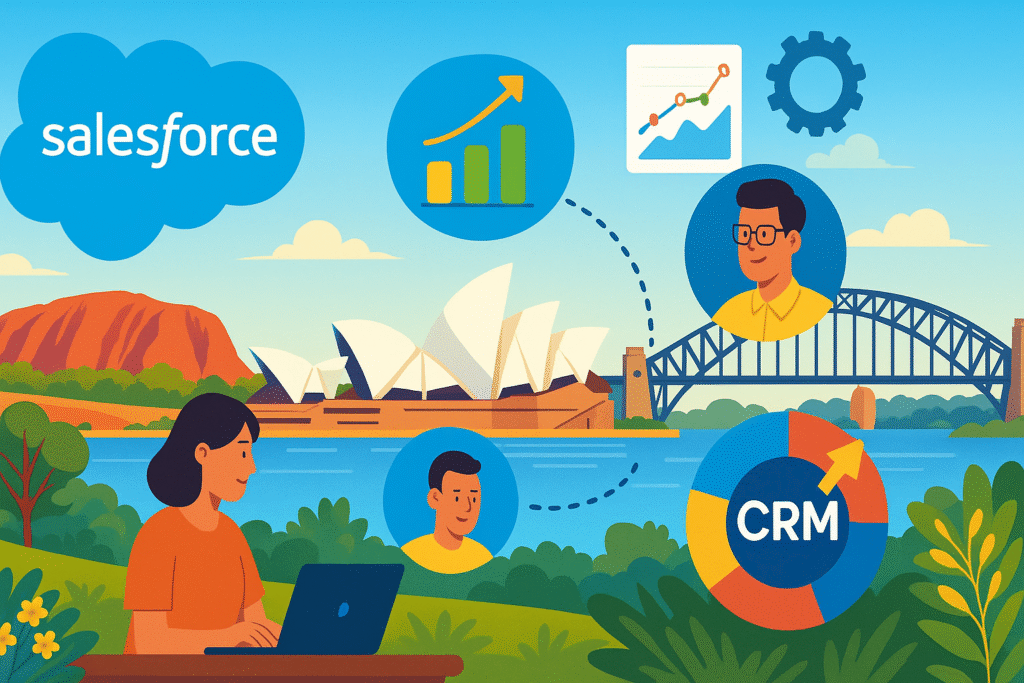Salesforce in Australia: 2025-26 CRM Trends and Demand

Introduction: Salesforce in Australia
Customer Relationship Management (CRM) systems have become the backbone of modern businesses, enabling organizations to streamline sales, marketing, and customer service operations. Salesforce, as the global leader in CRM solutions, continues to dominate the Australian market, helping businesses enhance customer engagement, automate workflows, and drive revenue growth.
This blog explores the key Salesforce trends and demand drivers in Australia for 2025-26, providing insights for businesses looking to stay ahead in a competitive market.
Table of Contents
1. The Growing Adoption of Salesforce in Australia
1.1 Market Expansion and Industry Penetration
Salesforce has seen exponential growth in Australia, with businesses across sectors finance, healthcare, retail, and government increasingly adopting its cloud-based solutions. Key factors driving this adoption include
- Digital Transformation: Australian businesses are prioritizing cloud migration to improve scalability and remote collaboration.
- Customer-Centric Strategies: Companies are leveraging Salesforce to enhance customer experiences through personalized engagement.
- Regulatory Compliance: Salesforce’s robust security features align with Australia’s stringent data protection laws (e.g., Consumer Data Right (CDR) and Privacy Act).
1.2 Demand for Salesforce Professionals
The surge in Salesforce adoption has led to a skills shortage, with high demand for:
- Salesforce Administrators & Developers
- Marketing Cloud Specialists
- Salesforce Architects & Consultants
Organizations are investing in upskilling employees and hiring certified professionals to maximize their CRM investments.
2. Key Salesforce Trends Shaping 2025-26 in Australia
2.1 AI-Powered CRM with Einstein AI
Salesforce Einstein AI is revolutionizing CRM by enabling predictive analytics, automated workflows, and hyper-personalized customer interactions. Key applications in 2025-26 include:
- Predictive Lead Scoring: AI identifies high-value leads, improving sales efficiency.
- Chatbots & Virtual Assistants: AI-driven support reduces response times.
- Sentiment Analysis: Businesses analyze customer feedback in real-time to improve satisfaction.
2.2 Hyper-Personalization with Customer Data Platforms (CDPs)
Salesforce CDP (Customer Data Platform) unifies customer data from multiple sources, allowing businesses to deliver tailored experiences. Trends include:
- Real-Time Personalization: Dynamic content recommendations based on customer behavior.
- Omnichannel Engagement: Seamless customer journeys across email, social media, and in-store interactions.
2.3 Automation & Low-Code/No-Code Development
Salesforce Flow Builder and MuleSoft integrations enable businesses to automate processes without extensive coding. Key trends:
- Citizen Developers: Non-technical users build custom apps using Salesforce Lightning.
- RPA (Robotic Process Automation): Automating repetitive tasks like data entry and invoice processing.
2.4 Sustainability & ESG Reporting
Australian businesses are increasingly focused on Environmental, Social, and Governance (ESG) compliance. Salesforce Sustainability Cloud helps organizations:
- Track Carbon Footprints
- Generate ESG Reports
- Align with Government Climate Policies
2.5 Hybrid Work & Salesforce Anywhere
With hybrid work becoming the norm, Salesforce Anywhere ensures seamless collaboration through:
- Mobile-First CRM Access
- Real-Time Collaboration Tools
- Integration with Microsoft Teams & Slack
2.6 Data Security & Compliance
As cyber threats rise, Salesforce is strengthening its security framework with:
- Zero Trust Security Models
- Advanced Encryption for CDR Compliance
- AI-Driven Threat Detection
2.7 Industry-Specific Salesforce Solutions
Salesforce is expanding its vertical-specific offerings, including:
- Financial Services Cloud (for banking & insurance)
- Health Cloud (for telehealth & patient management)
- Manufacturing Cloud (for supply chain optimization)
3. Demand Drivers for Salesforce in Australia (2025-26)
3.1 E-Commerce & Retail Growth
Australia’s e-commerce sector is booming, with Salesforce Commerce Cloud enabling:
- Unified Online & Offline Shopping Experiences
- AI-Driven Product Recommendations
- Seamless Checkout Processes
3.2 Government & Public Sector Adoption
Federal and state governments are leveraging Salesforce for:
- Citizen Service Portals
- Case Management for Social Services
- Data-Driven Policy Making
3.3 Healthcare Digital Transformation
Post-pandemic, healthcare providers use Health Cloud for:
- Patient Engagement & Telehealth
- Electronic Health Record (EHR) Integration
- AI-Powered Diagnostics Support
3.4 Financial Services Innovation
Banks and insurers rely on Salesforce for:
- Open Banking Compliance
- Personalized Financial Advice
- Fraud Detection with AI
3.5 SME Adoption of Salesforce
Small and medium enterprises (SMEs) are embracing Salesforce due to:
- Cost-Effective Starter Plans
- Scalability for Growth
- Access to Enterprise-Grade CRM Features
4. Challenges & Considerations for Australian Businesses
While Salesforce offers immense benefits, businesses must address:
- Integration Complexity (legacy systems, third-party apps)
- Data Privacy & Compliance Risks
- High Implementation Costs for SMEs
- Need for Continuous Employee Training
5. The Future Outlook: What’s Next for Salesforce in Australia?
By 2026, we can expect:
- Deeper AI & Machine Learning Integration
- Expansion of Metaverse CRM Experiences (virtual showrooms, AR customer support)
- Stronger Partnerships with Australian Tech Firms
- Increased Focus on Ethical AI & Responsible Data Use
Conclusion
Salesforce continues to be a game-changer for Australian businesses in 2025-26, driven by AI, automation, and a strong focus on customer experience. Companies that embrace these trends will gain a competitive edge, while those slow to adapt risk falling behind.
For organizations considering Salesforce, the key to success lies in strategic implementation, employee training, and staying updated with emerging technologies. As the CRM landscape evolves, Salesforce remains at the forefront, helping Australian businesses thrive in a digital-first economy.

